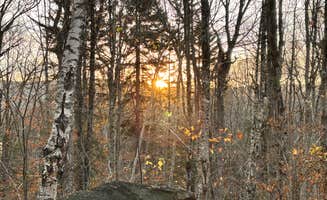Dispersed camping near Granby, Massachusetts requires campers to travel outside the immediate area for suitable sites. The Berkshire foothills terrain features a mix of private property and protected land with limited backcountry camping options. Winter temperatures can drop below 10°F, while summer months see average highs around 80°F, affecting site conditions and accessibility.
What to do
Explore hiking trails: George D Aiken Wilderness Dispersed provides access to several unmarked trails through dense forest terrain. "I just got here. Road was quite good. I believe I have the last of 4 sites. Nice camp fire area," reports MaryA L., noting the area's navigable access roads for day hikes.
Photography opportunities: Hogback Mtn Trailhead offers elevated vantage points for landscape photography from its mountain pass location. Boulder T. describes it as a "large open lot at top of paved highway pass" with "plenty of room for any number of rigs," making it convenient for setting up equipment.
Visit local attractions: The areas surrounding primitive camping options feature cultural points of interest within driving distance. "Brewery, distillery, beautiful lakes and scenic towns all within 15 minutes of the sites," notes one camper about the general region, offering day trip options from base camp.
What campers like
Spacious sites: George D Aiken Wilderness Dispersed receives consistent praise for its site layout. "Great spot for quiet desolate camping. Several spots to choose from," writes Evan M., highlighting the solitude factor valued by backcountry campers.
Road accessibility: Despite being backcountry sites, some dispersed camping areas maintain reasonable vehicle access. David G. found "a perfect site off the road on the right side. It was large and flat. We were off the road by 100 feet or so. It made it more private."
Weather resilience: Some sites remain usable even during wet conditions. Mary noted, "It was getting dark when we arrived and it had been raining all day. We just needed a night and it was great. Some sites were really wet but we found a nice dry place."
What you should know
Cell service limitations: Coverage varies significantly between sites. One camper specifically mentions "att cell reception" at George D Aiken Wilderness Dispersed, but other areas have no documented service, requiring appropriate offline navigation tools.
Seasonal closures: Winter conditions can render sites inaccessible without specialized vehicles. Roads to primitive sites are rarely maintained during snow periods from December through March.
Sanitation concerns: Proper waste management practices are essential as sites lack facilities. One camper at Jug End Dispersed noted it ranks in their "top 10 spots to stay at" but emphasized "trash cans, but carry out is preferable," highlighting the importance of leave-no-trace practices.
Regulatory verification: Site status changes frequently. A recent visitor to Jug End observed "This is a hiking trail only- no camping per website," referencing the Massachusetts government website, demonstrating the need to check current regulations before arrival.
Tips for camping with families
Site selection strategy: Families should prioritize sites farther from access roads for safety. At George D Aiken, campers mention spots "100 feet or so" from the road, creating better buffer zones from passing traffic.
Weather contingencies: Pack extra tarps and ground covers as sites can become waterlogged. "It was a little muddy from rain," reports Tam E., suggesting families prepare for sudden condition changes.
Wildlife awareness: The region hosts black bears and other wildlife requiring proper food storage. Connecticut River Farm Site and surrounding areas require bear-safe food practices during all seasons.
Tips from RVers
Parking limitations: Most dispersed sites accommodate smaller vehicles only. At George D Aiken Wilde Road Dispersed Site, the access road allows for RVs but requires careful navigation of narrow sections.
Leveling challenges: Come prepared with leveling blocks as most primitive sites feature uneven terrain. C H. mentions "The camp spots were all pretty spread out from each other and the road was easy to drive on," but notes terrain varies between the approximately 10 available spots.
Resource management: With no hookups available, RVers must practice strict water conservation. Plan for completely self-contained stays of 2-3 days maximum before requiring service area access for water and waste disposal.


